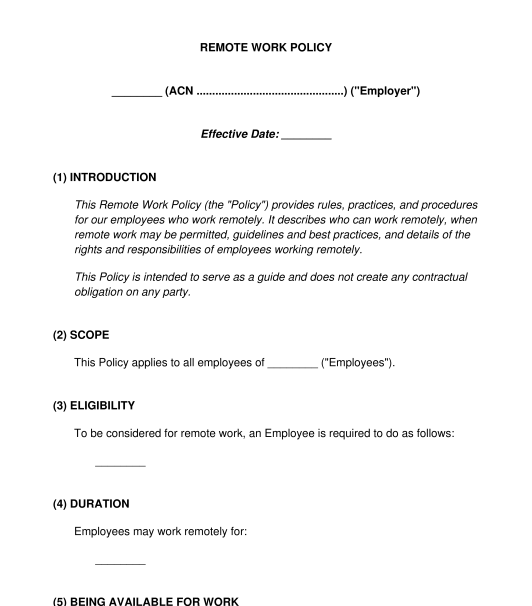 4 days ago
4 days ago

Answer a few questions and your document is created automatically.

Your document is ready! You will receive it in Word and PDF formats. You will be able to modify it.

 4 days ago
4 days ago
 Word and PDF
Word and PDF
 4 to 6 pages
4 to 6 pages
A Remote Work Policy is a guideline that regulates employees that work from a non-office location. Remote work is an arrangement between an employer and an employee authorising the employee to work from a suitable location other than the office environment or premises.
A Remote Work Policy helps employers to set their employees up to work remotely, by spelling out the situations in which a remote working arrangement may be authorised, the responsibilities of staff during the remote work, and the conditions for remote work.
In addition to a Remote Work Policy, there are various other employment policies that employers should consider, such as:
A Remote Work Agreement is a specific contract used for just one individual and the employer. It can be negotiated and adapted for the specific employee, and will cover such details as their rate of pay, and their various duties.
A Remote Work Policy on the other hand is much more general, outlining the general policies and expectations that will apply to all employees - such as the employer's general standards of conduct, any presentation standards, any basic equipment requirements, and various other matters.
While it is not mandatory for Australian organisations to have a written Remote Work Policy, if their employees are ever working remotely then it is highly advisable to have one. A written Remote Work Policy that is clearly communicated to employees can help the employer to manage its employees who are working remotely.
In addition, under Australian workplace health and safety laws, employers have a duty to ensure the health and safety of their employees (as far as reasonably practicable), even if employees are working remotely. Therefore, having a Remote Work Policy can help the employer to manage these obligations.
Usually senior members of staff will prepare the Remote Work Policy. This could involve senior managers or directors, or a human resources officer.
There is no expiry date for a Remote Work Policy so it can remain in place indefinitely.
However, it should be reviewed regularly to ensure that it is up to date with current laws and with the organisation's current practices.
Once a Remote Work Policy is ready, it should be printed and/or saved electronically and kept on file with the employer, and employees should be made aware of it. Any existing employees should be notified of it and given a copy of it. Many employers use a Letter to Employees about New or Updated Workplace Policies to do this. In addition, each time a new employee starts work with the employer, the new employee should be given a copy of the Policy.
It is a good idea to keep the Policy in a place where it is easy for employees to refer to it - for example, physical copies could be kept in communal areas such as staff rooms. It could also be made available online, for example on the employer's shared drive.
If the employer is getting employees to sign this Policy, the employer should get each employee to return a signed signature page, and should keep those signed pages on file.
From time to time, if the employer implements new rules or procedures, it may be necessary to update the Policy. When this occurs, the employer may notify employees of the updates, and release a new version of the Policy. The employer may ask employees to sign a new signature page at that time, to acknowledge the updated Policy.
In a Remote Work Policy, the employer sets out its general rules about remote work. This could include:
It is important that this document accurately reflects the employer's actual approach to remote work.
The Fair Work Act 2009 (Commonwealth) applies the National Employment Standards (NES), which are a set of minimum employment standards in Australia.
In addition, each state and territory has legislation that deals with various employment matters such as workplace health and safety or discrimination. Further information is available from Safe Work Australia. Employers need to be mindful of their workplace health and safety obligations which still apply, even if employees are working remotely.
This document does not take into account the requirements of modern awards or enterprise agreements. If such an award or agreement applies, then that will set out some additional minimum standards with which the employer must comply.
General principles of contract law, as provided by the common law, may also apply.
You fill out a form. The document is created before your eyes as you respond to the questions.
At the end, you receive it in Word and PDF formats. You can modify it and reuse it.
Guides to help you
Remote Work Policy - sample template - Word and PDF
Country: Australia